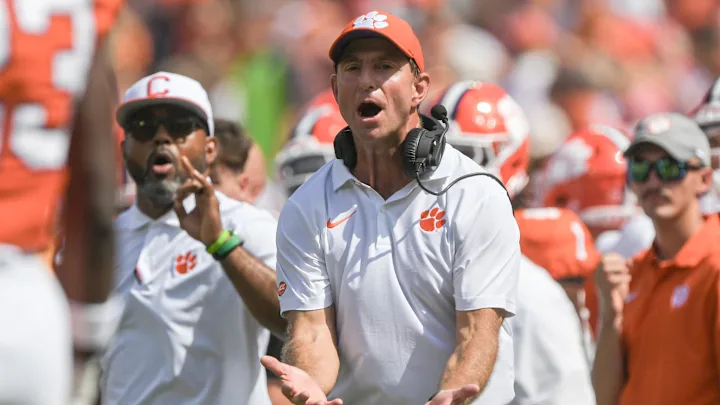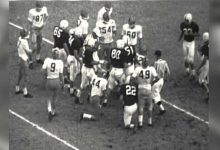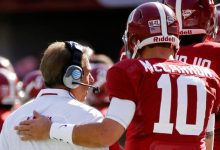Clemson HC Dabo Swinney in response to Comments made by Former Tiger Terry Kinard in regards to a post he made on Social Media concerning his son’s treatment at practice.

In the ever-vibrant world of college football, drama can often unfold beyond the football field, and recently, that’s exactly what happened when Clemson head coach Dabo Swinney found himself responding to comments made by former Tigers player Terry Kinard. Kinard, a legendary figure in Clemson football history, took to social media to express concerns over how his son, who is currently part of the Clemson football program, was being treated during practice. His post sparked a wave of reactions from fans, alumni, and media outlets, all of whom were eager to know how Coach Swinney would respond.
In the world of college athletics, where relationships between coaches, players, and families are critical to the culture of a program, any form of public disagreement or tension can quickly catch the attention of the public. And when the issue revolves around a former player, particularly someone as respected and well-known as Kinard, the situation becomes even more sensitive.
Coach Dabo Swinney, who has built a reputation over his 15-plus years as Clemson’s head coach as both a winner and a mentor, was put in the spotlight when he was forced to address the comments made by Kinard. While Swinney has a long history of defending his players and his coaching staff, this particular issue was personal, as it involved a respected former player and his son, who is a part of the Clemson football program.
This article will explore the circumstances surrounding the controversy, the comments made by Terry Kinard, and how Dabo Swinney responded to the situation. We will dive into the background of Kinard’s post, the ensuing reactions, and the impact it has on the relationship between the Kinard family and Clemson’s football program.
Terry Kinard is one of the most iconic players in Clemson’s storied football history. A former All-American defensive back for the Tigers, Kinard was a key figure in the 1981 National Championship team. His remarkable college career led him to be selected in the first round of the NFL Draft, where he played for the New York Giants and helped the team win a Super Bowl. Kinard’s legacy in Clemson football is cemented not only by his on-field achievements but also by his continued connection to the program and the players who followed in his footsteps.
Kinard’s son, currently a member of the Clemson football team, was recruited to play for the Tigers with the hopes of continuing the family tradition of excellence. Like his father, Kinard’s son is a talented player with a bright future, but it was his recent experience in practice that became the catalyst for controversy.
It all started with a post from Terry Kinard on social media, which caught the attention of the Clemson fanbase. In the post, Kinard expressed concerns about how his son was being treated during football practices. He referred to incidents during practice that he believed were unfair, perhaps even harsh, and he voiced his frustrations with the handling of his son’s development as a player. The comments were shared with a broader audience, sparking immediate reactions both in support and in criticism of the situation.
Kinard’s post, while not overtly accusatory, was clearly an emotional outcry from a father who felt his son’s well-being was being compromised in a highly competitive environment. He detailed incidents where he felt his son was being singled out, perhaps as a result of his status as a freshman or due to the high expectations placed on him. Kinard’s concern seemed to stem from his belief that his son, who had the pressure of living up to his father’s legacy, wasn’t being treated fairly or given the appropriate opportunity to succeed.
For many outside observers, Kinard’s post was seen as an extension of the sometimes-challenging relationships that can form when a legacy player—someone with deep ties to a program—entrusts their child to that same program. There’s an inherent pressure when a son follows in his father’s footsteps, and Kinard’s post seemed to reflect that tension.
The public nature of Kinard’s post immediately sparked reactions across the Clemson football community. Fans, alumni, and media outlets began weighing in on the situation, creating a heated debate about the treatment of players in college football programs and the responsibilities of coaches to manage such sensitive situations.
On one side, some fans were sympathetic to Kinard’s concerns, arguing that every player, regardless of their background or legacy, should be treated with respect and fairness. They emphasized the importance of player development, not just in terms of skill on the field, but also in terms of emotional well-being. They also pointed out that, as a freshman, Kinard’s son might be facing the kind of intense scrutiny that every young player goes through when adjusting to the demands of college football.
On the other side, there were many who defended Coach Swinney and the Clemson football program, arguing that Swinney’s leadership and the culture he has cultivated at Clemson are among the best in the nation. They stressed that Swinney’s approach to coaching emphasizes hard work, discipline, and personal growth, and that these values have been a central part of the program’s success. For many, Coach Swinney was seen as someone who would never intentionally harm or mistreat a player, especially not the son of a beloved former Tiger.
Some Clemson fans also raised questions about the motivations behind Kinard’s post, suggesting that it could have been a result of a father’s natural instinct to protect his son. While Kinard was a former player who had been around the program, his perspective was seen as potentially clouded by fatherly concern, especially if his son wasn’t receiving immediate playing time or if he was struggling to adjust.
As the comments and reactions to Kinard’s post grew louder, Coach Dabo Swinney found himself in the position of having to address the controversy. Swinney, known for his leadership and ability to manage the media, responded carefully and thoughtfully to the situation, offering his side of the story in a public statement.
Swinney acknowledged the importance of the Kinard family to the Clemson program and expressed his deep respect for Terry Kinard, both as a player and as a father. He emphasized that there was no ill will or intention to harm Kinard’s son and that the program takes player development seriously, especially when it comes to making sure every player feels valued and supported.
In his statement, Swinney explained that coaching in the college football environment is intense and highly competitive, which sometimes leads to situations where young players are pushed beyond their limits in an effort to help them grow. He made it clear that this was a standard practice at Clemson, where the goal is always to help players reach their full potential, both on and off the field. Swinney emphasized that these practices were not personal attacks but rather part of the process of building a strong, competitive team.
Swapping between empathy and clarity, Swinney assured fans that his approach to coaching would never compromise the welfare of any player, especially someone as important to the Clemson community as Terry Kinard’s son. He said that, while challenges and difficulties are a part of any college football player’s experience, every effort was made to create an environment that fosters growth, respect, and opportunity for all players, regardless of their background or legacy.
Swinney also made it clear that he had spoken personally with Terry Kinard to discuss the situation. According to Swinney, the conversation was productive, and the concerns raised by Kinard were addressed privately. Both Swinney and Kinard reportedly came to an understanding, with Kinard acknowledging the demands and pressures of the program and Swinney reiterating his commitment to fair and equitable treatment for all players.
The situation ultimately highlighted a deeper, ongoing dynamic between coaches, players, and their families in college athletics. While the controversy was eventually addressed and defused, it underscored the importance of open communication and understanding in an environment that can sometimes feel overly scrutinized.
For the Kinard family, this experience may serve as a reminder of how emotionally charged the college football world can be, especially when it comes to the legacies of former players. Terry Kinard’s public post reflected a father’s desire to protect his son, but it also brought to light the challenges young athletes face when entering a high-profile program like Clemson.
For Dabo Swinney and the Clemson football program, the situation served as an opportunity to reinforce the program’s commitment to integrity, fairness, and player development. Swinney’s response demonstrated his ability to balance the demands of the program with the emotional concerns of a player’s family—a skill that has helped him build strong relationships both within and outside the program over his years as head coach.
The back-and-forth between Terry Kinard and Dabo Swinney, sparked by a father’s concerns over his son’s treatment at practice, created a wave of attention in the college football world. Ultimately, the situation was resolved through open dialogue and mutual understanding, with both parties reaffirming their commitment to the Clemson football program’s values of fairness, respect, and development.
As the dust settles, it’s clear that the incident didn’t cause a rift between Kinard’s family and the Clemson football program. Instead, it highlighted the importance of addressing concerns directly and maintaining the integrity of the program. Moving forward, the hope is that all involved can continue to work together toward the shared goal of developing young athletes into both strong football players and well-rounded individuals.









